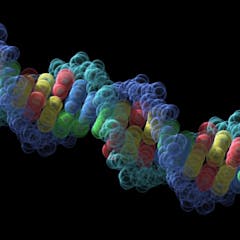
Articles on Electromagnetic radiation
Displaying 1 - 20 of 26 articles

After combing through museum collections, our team of researchers found a whopping 125 fluorescent mammal species – from polar bears and dolphins, to leopards, zebras and wombats.

Studying the brief and tiny quantum effects that drive living systems could one day lead to new approaches to treatments and technologies.

Ultraviolet radiation at specific wavelengths is great at killing germs – but when used incorrectly, it can also cause health risks.

Like a cosmic butterfly in the sky, radio galaxy PKS 2014-55 was observed by CSIRO researchers with the Australian SKA Pathfinder telescope.

As if attacks on health workers weren’t upsetting enough, reports indicate broadband engineers are now also being abused - as conspiracy theorists link 5G technology with to COVID-19’s spread.

Free space optical communication will allow the same connectivity in space we already have on Earth. And this will provide benefits across a number of sectors.

A recent study suggests that smart meters can help households reduce their electricity use by as much as 5%. Are France’s anti-Linky households listening?

Is it necessary to control exposure to electromagnetic waves by limiting the number of relay antennas? Yes, but that’s not the only thing.

Studies suggest electrosensitivity is a “communicated” disease, spread by people hearing about the alleged dangers, and sometimes worrying themselves sick.

Did your holiday gift list include radiation-shielding undies to protect your privates from cellphone radio waves? A radiation expert explains they’re unnecessary – your phone won’t affect your fertility.

Don’t throw away your phone quite yet. There are a lot of unanswered questions surrounding the latest study that found a connection between mobile phones and cancer.

Astronomers were looking forward to the first high-res X-ray spectra from space, and all they would tell us about the cosmos. But unknown disaster seems to have befallen the Japanese satellite.

ABC’s Catalyst episode “Wi-Fried” claimed that mobile phones and Wi-Fi might be a cancer risk, but the leading experts are not so convinced.

Wi-Fi networks are everywhere, from cafes and libraries to shopping centres. So should we be worried now a French woman has won compensation after she complained of an allergy to Wi-Fi?

How a long dead mathematician called Maxwell can speed up your internet.

It’s hard to imagine life without mobile phones, radio and television. Yet the discovery of the electromagnetic waves that underpin such technologies grew out of an abstract theory that’s 150 years old…

Police play a proverbial cat-and-mouse game with those they pursue, but also with the technology of the day they use. This game of one-upmanship, of measure and countermeasure, sees one or the other side…

Space may seem calm, but it is a more hostile environment than that on Earth. Invisible radiation is a big problem for space enthusiasts and scientific instruments. Substituting electronic devices to do…

A new study has claimed that keeping mobile phones in trouser pockets can damage a man’s sperm count, affecting his chances of becoming a father. While the possibility that mobile phone radiation could…

Earlier this year, the US Federal Aviation Authority (FAA) put together a panel of aviation experts to look at whether personal electronic devices (PEDs) could be used on planes without compromising safety…
